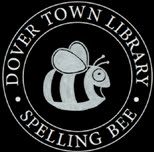The words are at the printer's. Here are some highlights of the list, and a summary of how we put the word list together:
It is an ongoing and humbling challenge to compile a list of words that will prove entertaining, thought-provoking and pleasantly difficult for the variety of teams participating in the Bee, and stimulating and accessible for the Bee’s wider audience. People enter the Bee for diverse reasons: some are drawn to the challenge of the word list, some—like elected officials, and members of our town boards--play to support the Library, some—like neighborhood teams or school-related teams--play to highlight their team’s connection to the Dover community and its Library. All of these reasons are terrific, but they do suggest different approaches to the words we choose for the competition. We have to accommodate the diversity of our players in a way that respects their reasons for playing. In an attempt to achieve this goal, we do the following:
1) We give players the words in advance
2) We break the words down into categories, so that spellers can prepare using the strengths of their individual members
3) We allow Mulligans—everybody needs the occasional Mulligan!
When we first began the Bee, it was possible to buy prepared word lists from the Scripps Company—they are the folks who sponsor the National Spelling Bee. Over the years, Scripps has changed its focus to partner with local sponsors, and no longer sells copies of their Paideia (or word list): their approach is no longer a “fit” with our fundraiser. For the past 3 years, we have prepared our own list. We cull the words from a variety of sources, including prior years’ lists, word websites and e-mail lists, and the occasional suggestion from those around us (my kids especially have been sources of inspiration).
In organizing the words into categories this year, the phrase “Back to Basics” has been foremost in my mind. We’re at a point in our collective economic life where most of us are being forced to reconsider our priorities, and focus on what is really important to us. I found myself reaching back into the worlds of tradition, myth and legend for the categories of “Noah’s Ark” (words about animals, travel, weather and geography), “Pandora’s Box” (illnesses and misery, physical and social; with a sprinkling of hope and beauty), and “Babble-On” (words about language, words about building, words concerning the cultural and spiritual worlds). The stories that these categories refer to are part of the fabric of our common culture, and their stories, after millennia, remain relevant and compelling. Similarly, the Spellers’ and Sponsors’ support of the Library affirms the idea of Back to Basics: these folks have chosen to support a basic, local institution—one which is understood to be essential by its loyal patrons but which risks dismissal as expendable in an economy that cries out for widespread cutbacks and layoffs.
The category “It’s Alimentary, my dear Watson” sprang from the amazement I feel when I read food and medicine ingredient labels. It’s astonishing to see what prepared food contains, and disturbing to think how little of it bears resemblance to the product it is supposed to be. The “Alimentary” category is just another way of looking back to basics.
“Shirley, you jest!” is a small category of tricky and fun words: the Mondegreens, the puns, homonyms, the words that look like they ought to mean something other than what they mean. After a year of thinking about this word list, some of the funny bits stand out in my mind. I hope you will enjoy them.
Thank you for supporting the Library, and for playing in the Bee. All of us on the Bee Committee wish you a wonderful time.
Wednesday, February 11, 2009
Subscribe to:
Post Comments (Atom)




No comments:
Post a Comment